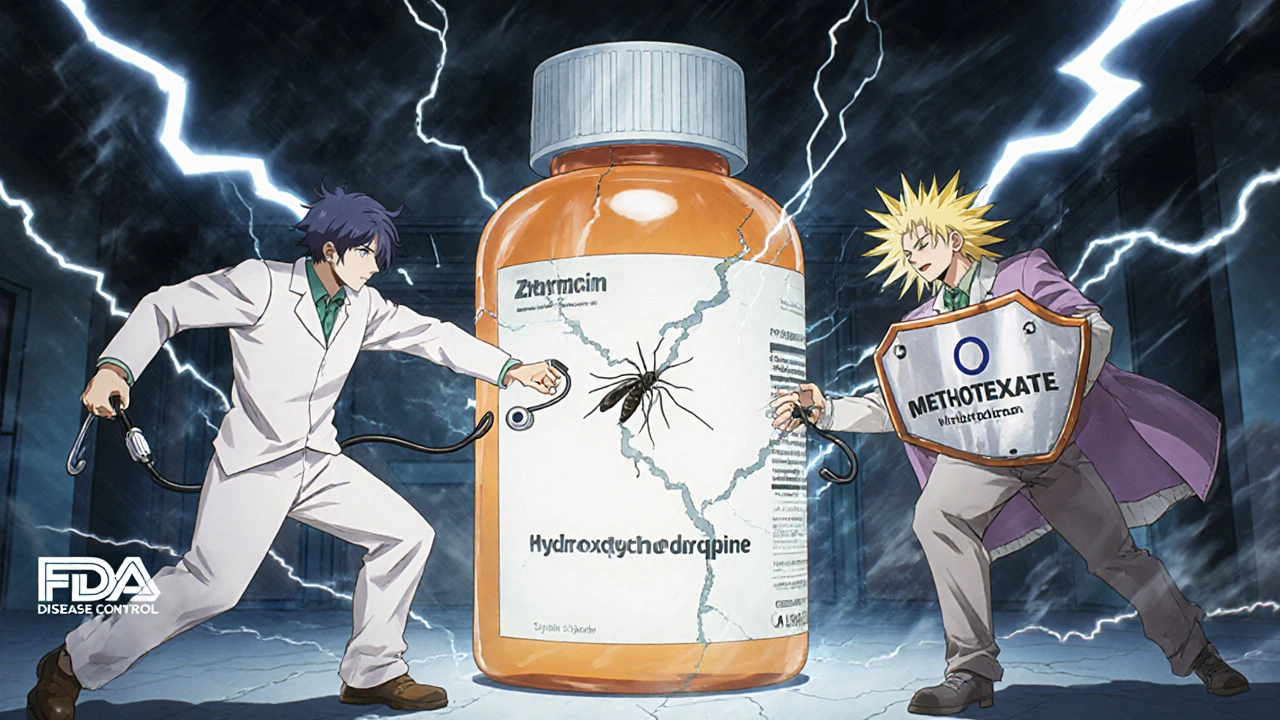Hydroxychloroquine Treatment Comparison Tool
Select your condition
Treatment Comparison
Hydroxychloroquine, sold under the brand name Hsquin, was once widely discussed for its potential use in treating malaria, lupus, and rheumatoid arthritis. But after the pandemic, its reputation changed dramatically. Today, it’s no longer a go-to option for most infections - and many doctors avoid prescribing it unless absolutely necessary. If you’re wondering whether Hsquin is still a valid choice, or if there are better alternatives, you’re not alone. This guide breaks down what hydroxychloroquine actually does, how it stacks up against other drugs, and which options are safer and more effective today.
What hydroxychloroquine (Hsquin) actually does
Hydroxychloroquine is an antimalarial drug that also works as a disease-modifying antirheumatic drug (DMARD). It’s been around since the 1940s. Its main job is to calm down the immune system. That’s why it’s still used for chronic conditions like lupus and rheumatoid arthritis - where the body attacks its own tissues.
For malaria, it stops the parasite from breaking down hemoglobin in red blood cells. But here’s the catch: many strains of malaria have become resistant to it. In parts of Southeast Asia and Africa, hydroxychloroquine doesn’t work anymore. Even in places where it still has some effect, doctors now prefer artemisinin-based combinations because they work faster and with fewer side effects.
The big problem with Hsquin isn’t just that it’s less effective anymore - it’s the risks. Long-term use can damage your retina. That’s why people on hydroxychloroquine for lupus need annual eye exams. It can also cause heart rhythm problems, especially when mixed with other drugs. In 2020, the FDA pulled emergency authorization for its use in COVID-19 after studies showed it increased the risk of dangerous heart arrhythmias and death.
Chloroquine: the older cousin
Chloroquine is hydroxychloroquine’s direct relative. Both are in the same drug family. Chloroquine was the original antimalarial, developed in the 1930s. It’s stronger against malaria, but also more toxic.
Compared to hydroxychloroquine, chloroquine has a higher risk of eye damage and heart issues. It’s also more likely to cause low blood sugar and seizures. Because of this, most doctors avoid chloroquine unless there’s no other option - like in rare cases of chloroquine-sensitive malaria in travelers who can’t take newer drugs.
For autoimmune diseases, hydroxychloroquine replaced chloroquine decades ago because it’s better tolerated. If you’re on Hsquin for lupus, switching to chloroquine would be a step backward, not forward.
Azithromycin: the antibiotic alternative
During the early days of the pandemic, azithromycin - an antibiotic - was paired with hydroxychloroquine in hopes of fighting COVID-19. That combo didn’t work. But azithromycin itself has value in other areas.
It’s not an antiviral. It doesn’t kill viruses. But it has anti-inflammatory properties. That’s why it’s sometimes used off-label for chronic lung conditions like bronchiectasis or cystic fibrosis. It reduces flare-ups by calming airway inflammation.
For bacterial infections, azithromycin is still a first-line treatment for things like chlamydia, strep throat, and certain skin infections. Unlike hydroxychloroquine, it doesn’t carry the same heart rhythm risks - unless you already have a pre-existing condition like long QT syndrome.
Key difference: Azithromycin treats infections. Hydroxychloroquine modulates the immune system. They’re not interchangeable. But if you’re looking for something with less toxicity than Hsquin and real-world use in chronic disease, azithromycin fits that profile - just not for the same reasons.
Ivermectin: the controversial option
Ivermectin is an antiparasitic drug used to treat river blindness and scabies. It’s also approved for some intestinal worms. During the pandemic, it became a viral favorite as a supposed COVID-19 cure - despite no solid evidence.
The FDA and WHO both warn against using ivermectin for viral infections. Human doses are much lower than what’s used in animals. Taking livestock-grade ivermectin has led to hospitalizations due to vomiting, dizziness, and even neurological damage.
For malaria prevention, ivermectin has shown some promise in field studies by killing mosquitoes that bite treated people. But it’s not a replacement for hydroxychloroquine in treating active infection. And it doesn’t work for autoimmune diseases at all.
If you’re considering ivermectin as an alternative to Hsquin, you’re comparing apples to rockets. They don’t do the same thing. And using it for unapproved purposes is risky.

What’s actually recommended today
For autoimmune diseases like lupus or rheumatoid arthritis, hydroxychloroquine is still used - but not alone. It’s often combined with methotrexate, sulfasalazine, or biologics like adalimumab. These drugs are more effective at stopping joint damage and flare-ups.
For malaria, the World Health Organization recommends artemisinin-based combination therapies (ACTs). Drugs like artemether-lumefantrine or artesunate-amodiaquine are now standard. They clear the parasite faster and reduce the chance of resistance.
For other infections - like bacterial pneumonia or skin infections - antibiotics like amoxicillin, doxycycline, or cefdinir are preferred. They’re cheaper, safer, and proven.
The bottom line: Hydroxychloroquine has very narrow, specific uses today. Outside of lupus and rheumatoid arthritis - and even then, often as a second-line option - there are almost always better, safer alternatives.
Side effects comparison
Here’s how Hsquin stacks up against common alternatives:
| Drug | Common side effects | Serious risks | Monitoring needed |
|---|---|---|---|
| Hydroxychloroquine (Hsquin) | Nausea, headache, dizziness, skin rash | Retinal damage, heart arrhythmias, muscle weakness | Annual eye exam, ECG if on long-term use |
| Chloroquine | Same as Hsquin, worse nausea | Higher risk of retinal and heart toxicity | More frequent eye exams, strict dose limits |
| Azithromycin | Diarrhea, stomach pain, mild nausea | Heart rhythm issues (only if pre-existing condition) | ECG if history of QT prolongation |
| Ivermectin | Dizziness, nausea, itching | Neurological toxicity (if overdosed) | None for approved uses; avoid off-label use |
| Methotrexate | Fatigue, mouth sores, mild liver stress | Liver damage, low blood cell counts | Monthly blood tests, folic acid supplement |
Notice something? Hydroxychloroquine and chloroquine share the same dangerous long-term risks. Azithromycin has fewer risks but doesn’t treat the same conditions. Methotrexate - a common lupus drug - has its own risks, but it’s more effective at stopping disease progression.
When you should avoid hydroxychloroquine
Don’t take Hsquin if you:
- Have retinal disease or a family history of macular degeneration
- Have a heart condition like long QT syndrome or heart failure
- Are pregnant or breastfeeding without doctor approval
- Take other drugs that affect heart rhythm (like certain antidepressants or antibiotics)
- Have liver or kidney disease - your body can’t clear it properly
- Are using it for COVID-19, flu, or any viral infection - it doesn’t work
Even if you’ve taken it safely before, your risk changes over time. Age, other medications, and health changes matter. Always talk to your doctor before restarting.

What to do if you’re currently taking Hsquin
If you’re on hydroxychloroquine for lupus or rheumatoid arthritis:
- Don’t stop suddenly. That can trigger a flare.
- Ask your rheumatologist if you still need it. Many patients can reduce the dose or switch to newer drugs.
- Get your eyes checked if it’s been over a year.
- Review all other medications you take - some interact dangerously with Hsquin.
- If you’re using it for something else - like a past COVID-19 treatment - stop and talk to your doctor.
If you’re taking it for malaria prevention:
- Switch to an artemisinin-based combo. It’s more reliable.
- Use mosquito nets and repellents - drugs aren’t 100% protective.
- Check CDC or WHO travel advisories for your destination - resistance maps change yearly.
Frequently Asked Questions
Is hydroxychloroquine still prescribed at all?
Yes, but only for specific autoimmune conditions like lupus and rheumatoid arthritis - and even then, often as a background medication. It’s rarely used for infections anymore. Doctors prescribe it only after considering safer, more effective options.
Can I buy hydroxychloroquine over the counter?
No. Hydroxychloroquine is a prescription-only medication in Australia, the U.S., and most countries. Even online pharmacies that claim to sell it without a prescription are breaking the law and may sell counterfeit or unsafe versions.
Are there natural alternatives to hydroxychloroquine?
There are no proven natural alternatives that work the same way. Supplements like turmeric or omega-3s may help reduce inflammation slightly, but they don’t stop autoimmune damage like hydroxychloroquine does. Don’t replace your prescribed medication with herbs or vitamins without talking to your doctor.
Why was hydroxychloroquine so popular during the pandemic?
Early, small studies suggested it might help with COVID-19. Media and political attention amplified those claims. But large, rigorous trials - including the WHO’s Solidarity Trial - found no benefit and clear risks. The hype was based on poor science, not solid evidence.
What should I do if my doctor prescribes hydroxychloroquine?
Ask why. Request the reason it’s being prescribed and whether there are safer alternatives. If it’s for an autoimmune disease, ask about monitoring plans for your eyes and heart. If it’s for an infection, push for evidence - most infections today have better, safer treatments.
Next steps
If you’re considering switching from hydroxychloroquine, start by talking to your doctor. Bring a list of all your medications and ask: Is this still the best option for me? What are the alternatives? What are the risks if I stop or keep going?
For lupus patients, newer biologics like belimumab are changing outcomes. For malaria travelers, ACTs are the gold standard. For anyone using Hsquin off-label - stop. The risks outweigh any unproven benefits.
Medicine evolves. Just because a drug was once popular doesn’t mean it’s still right. Hydroxychloroquine has a place - but it’s smaller than it used to be. Knowing where that place is, and what else is available, keeps you safer and healthier.





Comments (10)